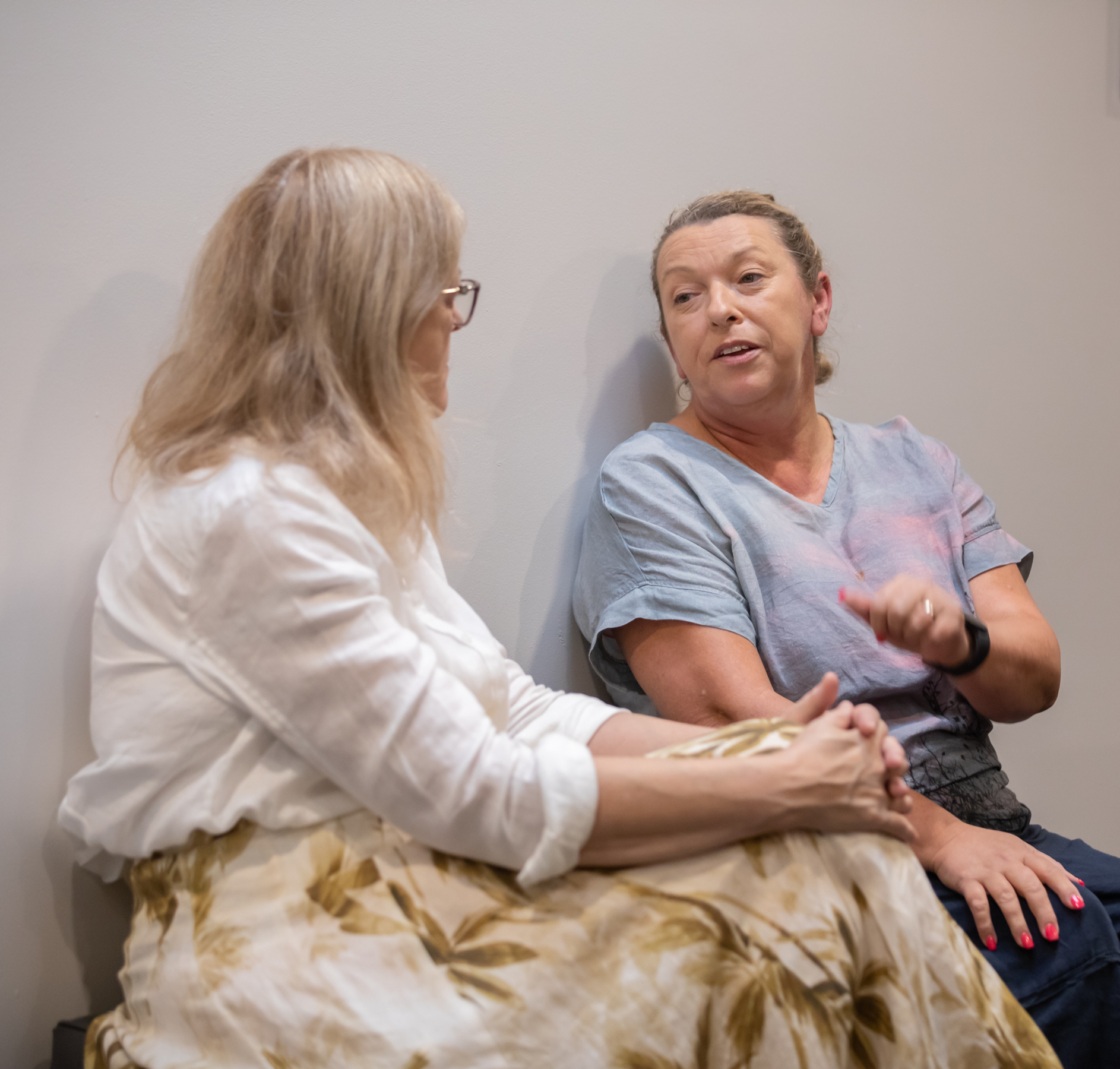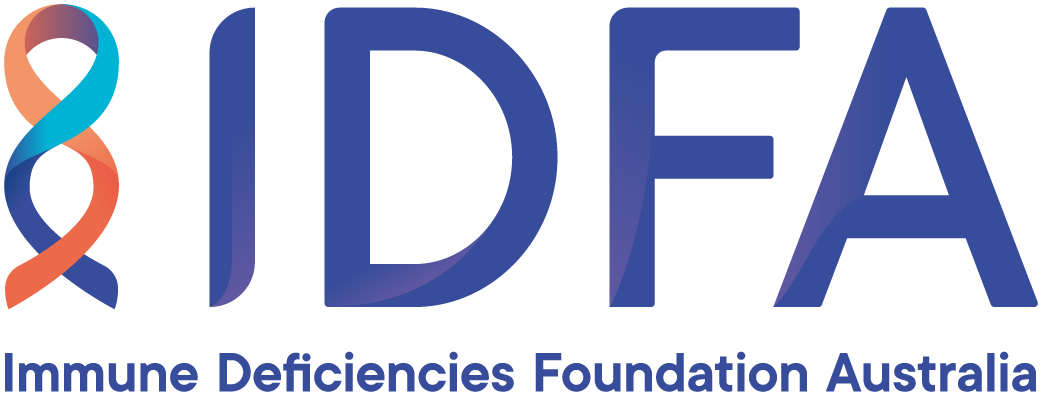
Become a Mentor
Circle of Support is a free one-on-one peer mentoring program that helps IDFA members strengthen their self-management skills and social-emotional wellbeing while living with an immunodeficiency.
The goal of Circle of Support Peer Mentoring is to empower members to explore options, ask questions, and take action steps that align with their personal needs and goals. You can find our frequently asked questions for Peer Mentors below.
Could you be a Peer Mentor?
We’re looking for IDFA members with lived experience—either managing their own immunodeficiency or caring for someone with one—who are:
- Empathetic and supportive – Able to listen attentively and understand the challenges faced by others.
- Great communicators – Comfortable having open, encouraging conversations.
- Willing to share their experiences – Ready to offer insight and guidance to fellow members.


As a Peer Mentor, you’ll play a key role in supporting members through:
- Social and Emotional Wellbeing – Helping members build resilience, foster social connections, and access mental health first aid if needed.
- Coaching – Supporting members through change and encouraging them to try new strategies to improve their confidence and self-efficacy.
- Mentoring – Sharing experiences to help members develop self-awareness, self-management, and self-advocacy skills, empowering them to take charge of their health.
As a Peer Mentor, you’ll play a key role in supporting members through:
- Social and Emotional Wellbeing – Helping members build resilience, foster social connections, and access mental health first aid if needed.
- Coaching – Supporting members through change and encouraging them to try new strategies to improve their confidence and self-efficacy.
- Mentoring – Sharing experiences to help members develop self-awareness, self-management, and self-advocacy skills, empowering them to take charge of their health.

By becoming a Peer Mentor, you can make a meaningful impact while building connections within the IDFA community. To express your interest in becoming a mentor, please complete the EOI form.

Connect one-to one with someone who has lived experience of life with immunodeficiency.

Empower yourself to work towards personal goals for wellbeing, treatment and lifestyle.

Improve your quality of life through free, personalised, and holistic peer mentoring.
EOI to Become a Peer Mentor
Frequently Asked Questions for Mentors
How long is a Circle of Support Peer Mentoring period?
Members can receive peer mentoring support for up to 12 weeks, or a shorter period if they prefer to focus on specific goals. Ideally, goals set in the Circle of Support Plan should be achievable within this timeframe.
However, if a member wishes to continue working on their existing goals, add new ones, or extend their support due to illness or other interruptions, they can discuss this with their Peer Mentor. If the Peer Mentor is available, the mentoring period can be extended.
If the original Peer Mentor is unavailable for an extension, IDFA can match the member with a new Peer Mentor to ensure they continue receiving support.
What happens once I’m matched with an IDFA member?
Once matched, the Peer Mentor receives the member’s sign-up form, including their contact details. The Peer Mentor then contacts the member at their preferred time to introduce themselves, explain the Circle of Support program, and answer any initial questions.
The first contact is an opportunity for both the member and the Peer Mentor to determine if they are the right fit and whether they wish to proceed with the mentoring relationship.
During this conversation:
- The member shares their story, current challenges, and areas where they would like support.
- The Peer Mentor provides an overview of how the program works, the benefits of participation, and their own background and journey, if relevant.
- The Peer Mentor discusses their availability and preferred methods of contact.
- Together, they explore the member’s current health and wellbeing status, motivations, and readiness for change in their identified areas of interest.
This initial discussion helps build rapport and ensures that the mentoring process is tailored to the member’s needs and goals.
How do Peer Mentors help members create a personalised action plan?
If the member chooses to proceed, the Peer Mentor will guide them in prioritizing support areas, setting goals, and developing practical action steps. This process may take multiple discussions to ensure the plan aligns with the member’s needs.
The member then drafts their CoS Plan, including:
- Goals and action steps
- Contact schedule (frequency, preferred days/times, and method—phone, video chat, or face-to-face)
Once completed, the member sends their plan to the Peer Mentor, who submits it to IDFA. If needed, the Peer Mentor can assist with writing the plan or using digital tools like DocuSign for signatures. A hardcopy option is also available.
The CoS period officially begins when the signed plan is submitted, and the member can contact their Peer Mentor as agreed. If video chat is preferred, the Peer Mentor will provide a link via IDFA’s platform.
What areas can a member choose for support?
A member’s Circle of Support Plan can focus on various personal goals, including:
- Mental health and wellbeing
- Exploring treatment options like SCIg and working with healthcare providers
- Self-advocacy and navigating the healthcare system
- Managing fatigue, pain, and treatment costs
- Balancing work, study, or major life transitions
- Holistic self-management, including nutrition, sleep, and physical activity
Ideally, members include goals for mental health, social connection, and related action steps in their CoS Plan. Peer Mentors help members identify and prioritize areas for support, ensuring their plan is practical, achievable, and tailored to their personal needs.
What if the member does not want to complete a CoS Plan?
If a member is unable to set goals or action steps, they may not be ready to engage in structured mentoring. This could be due to life changes, a recent diagnosis, or mental health challenges like anxiety, depression, or trauma.
In these cases, the Peer Mentor focuses on providing social and emotional support, prioritizing connection over structured goal-setting. Mental Health First Aid may also be offered if relevant.
When the member feels ready, the Peer Mentor can help them develop a simplified CoS Plan with a focus on mental wellbeing and social connection.
Who contacts who and how often?
The Peer Mentor makes the first contact to introduce the program, answer questions, and confirm if the member wishes to proceed. From there, the Peer Mentor and member negotiate contact arrangements, which may include:
- Video-chat: The Peer Mentor emails the member a video chat link for the agreed day and time. If the member misses a session, the Peer Mentor follows up with a new link for the next scheduled session.
- Phone calls: The member is encouraged to call the Peer Mentor during the agreed times, or if availability changes weekly, the Peer Mentor may initiate contact within the nominated days and times outlined in the CoS Plan.
- Email: The Peer Mentor can email to schedule video chats, share availability, and send useful resources, but email is not used for mentoring support.
It is recommended that members and Peer Mentors connect at least once a fortnight. More frequent contact is at the discretion of the Peer Mentor and should be agreed upon in the CoS Plan.
What happens at the end of the CoS period?
At the end of the CoS period, the member may:
- Feel they have achieved their CoS Plan goals.
- Feel confident in self-managing their identified support areas.
- Decide they no longer need mentoring support.
If the member wishes to continue, they can discuss extending their CoS Plan with their Peer Mentor, based on availability.
Are peer mentoring contacts private?
Yes, all contact between a Peer Mentor and a member is private and confidential. Peer Mentors are IDFA volunteers and must follow the IDFA Privacy and Confidentiality Policy and Code of Conduct.
If a Peer Mentor has concerns about a member’s mental or physical wellbeing, they must refer the member to a relevant support service, such as their GP, and inform IDFA. The Peer Mentor will encourage the member to follow up within seven days to discuss any actions taken and explore next steps.
If the member does not initiate contact within seven days, or the Peer Mentor is unable to reach them, IDFA is informed. Depending on the situation, IDFA may take further steps, including checking in with other contacts or arranging a Police Safety Check. In such cases, the Circle of Support program is put on hold until the member’s wellbeing is confirmed.
What do I do if I’m concerned about a member’s mental or physical wellbeing?
As a Peer Mentor, you can provide Mental Health First Aid and Accidental Counselling to support the member. Your role is to:
- Ensure the member feels heard and supported.
- Provide relevant support contacts they can reach out to.
- Encourage them to follow up with their GP or other healthcare provider, if needed.
- Help them identify simple steps to support their current wellbeing.
If appropriate, the member can also include mental wellbeing actions in their CoS Plan to guide ongoing support.
What if a member gets sick or needs to travel during CoS?
Circle of Support is flexible, recognizing the day-to-day challenges of living with an immunodeficiency. If a member or Peer Mentor needs to adjust contact due to travel, work, study, or caregiving commitments, they can update their CoS Plan to reflect these changes.
If a member’s circumstances change significantly due to their immunodeficiency, they can modify their goals and action steps to focus on their immediate support needs. Peer Mentors and members can work together to ensure the program remains relevant and supportive throughout the mentoring period.
Can a Peer Mentor provide a member with support materials, including web links?
Yes, you can share written and web materials that have helped in your own journey, as long as:
- The materials directly relate to the member’s CoS Plan support areas.
- The materials are included in SMIDs training or meet the following criteria:
- You have reviewed them and believe they pose no risk.
- You advise the member to discuss them with a relevant healthcare professional.
- They are authored by a peak organisation, registered healthcare professional, or recognised authority.
- Ideally, they are designed for the Australian population.
- They are provided as optional information, not advice.
Please send useful materials to IDFA for review and potential inclusion in the CoS Peer Mentor library or SMIDs training.
What happens if a member raises a compliant?
If a member raises a concern:
- Listen and clarify to ensure you understand their issue.
- Acknowledge their concerns and address any misunderstandings.
- If the issue cannot be resolved, and the member wishes to exit CoS, notify IDFA.
IDFA will send the member a ‘CoS Close’ email with a feedback survey and the option to discuss their concerns further. If necessary, IDFA may follow up with both the member and the Peer Mentor to investigate the matter.
